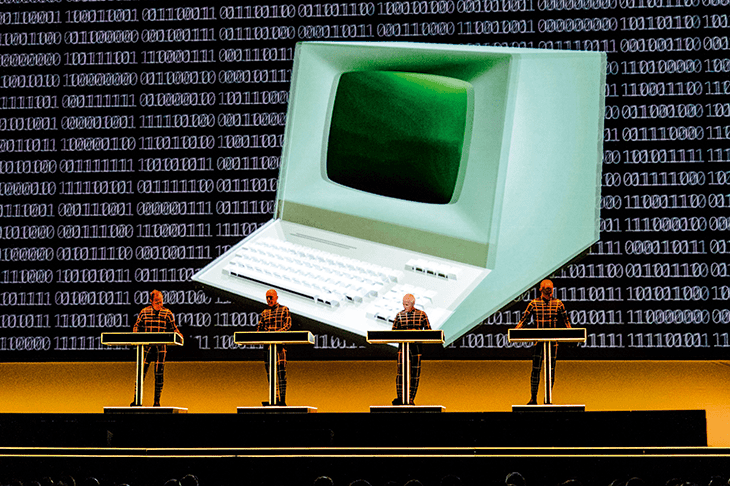As Kraftwerk took their 3D show around Britain last week, a document from 2013 surfaced online, purporting to be their requirements for car transportation while on tour, necessitated by ‘rather bad driving experiences in the recent past in various parts of the world’. Kraftwerk, it said, should only be driven by ‘suave gear changers (if car is not automatic)’ and ‘suave breakers’. Both radio and aircon should be turned off, and on no account should the driver talk to the band.
It had the effect of making the Düsseldorf quartet — long since down to one original member, Ralf Hütter — look like grumpy old men who would rather be at home tinkering with their racing bikes. It was also another chip to the carapace of mystery that was long one of their most efficient tools. If Kraftwerk aren’t exactly Bob Dylan on his Never Ending Tour, then opportunities to see them aren’t as sparse as they once were. These days, too, Hütter’s interviews don’t see him dwelling on the need to eliminate the human from music, but have him teasing his publicist for looking as though he should be in Rod Stewart’s band.
If anything, Kraftwerk have transformed from the most forward-looking pop group in history — as influential as the Beatles, perhaps more so given the way mechanised music-making has taken over the recording industry in the past 35 years — into the very embodiment of the heritage rock act, taking a largely unchanging set around prestigious concert halls for people willing to pay a large amount of money for the privilege, and doing so for years on end. When they toured the UK in 1992, the venues they visited included Leicester Polytechnic and the University of East Anglia; now that they are unquestionably enshrined in pop history, it’s all high-status shows.
None of this is to traduce them. The songs Kraftwerk played at the Royal Albert Hall are the fabric of modern pop, and they are great, great songs: ‘Autobahn’! ‘The Model’! ‘Trans Europe Express’! ‘Radioactivity’! ‘The Robots’! ‘Computer Love’! From them springs techno, and therefore a great many of the mutations of house music and electronic R&B that were adopted and adapted into the chart styles that prevail today. It seems harsh on Hütter et al. to blame them for, say, the hugely popular and hugely dire Chainsmokers, and it is entirely possible that Chainsmokers have never listened to Kraftwerk. But the one springs — via many generations of genetic alteration — from the other.
For those who have been watching Kraftwerk since their reemergence, though, the current tour is starting to wear a little. The music will never grow old, not least because since the 1991 album The Mix, which retooled their greatest hits for a post-house age, they have continually tinkered to keep the songs sounding contemporary in performance. But the famous graphics? They are almost unaltered from those that British audiences saw in 2004, save for the addition of 3D effects, and those were present in The Catalogue performances at Tate Modern in 2013 (and first introduced into their performances in 2009).
Now, in fact, there’s something almost charmingly clunky in what was once, if not futuristic, then at least the embodiment of the outer edges of the possibilities of the present. The typefaces on the giant screen looked like the work of an 11-year-old fiddling with his ZX81, back when ‘The Model’ was a hit single in the UK. The robotic figures that replaced the band for ‘The Robots’ looked and moved like the monsters from an end-of-series episode of Tom Baker-era Doctor Who. The sense of threat that people have detected in songs such as ‘Radioactivity’ seemed a little overdone, too. ‘It’s in the air for you and me… Discovered by Madame Curie,’ Hütter intoned. It was hard not to snigger.
When ‘Computer World’ warned about the dangers of Interpol, Scotland Yard, the CIA and the KGB controlling data, the limitations of prognostication became apparent. Were Kraftwerk writing that song now, it would be about shadowy groups of friendless nerds in their parents’ basements, hacking and leaking, exposing and revealing. They were right that digital information would become a terrifying prospect, wrong about who would be its most terrifying revelators.
Kraftwerk, once a cutting edge so sharp they made pop bleed, are now no different from Kiss: a hugely enjoyable experience, but utterly predictable. What used to be not far short of performance art is now more akin to pantomime. Where’s the future? It’s behind you!






Comments